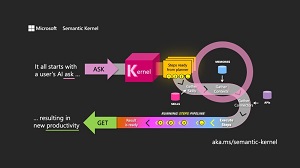News
Microsoft Seeks to Sort & Simplify its Agentic AI Dev Story
Microsoft is sorting out its dev tooling for one of the hottest areas of the nascent GenAI age, agentic AI.
Agentic AI goes beyond simple prompt-and-response chatbots and content generation to provide more sophisticated, interactive and autonomous AI agents that can act on behalf of users, such as personal assistants, customer service agents, sales agents and so on.
To sort out and simplify its tooling for this new frontier, the company will infuse multi-agent runtime tech (autogen-core) developed in its AutoGen research project into its production-ready Semantic Kernel SDK, a lightweight, open-source development kit designed to help developers build AI agents and integrate advanced AI models into their applications.
 [Click on image for larger view.] Semantic Kernel (source: Microsoft).
[Click on image for larger view.] Semantic Kernel (source: Microsoft).
"Microsoft's agentic AI frameworks, Semantic Kernel and AutoGen are deeply collaborating to provide the best-in-class agentic developer experience. With Semantic Kernel's enterprise ready AI capabilities, customers can already use and get support for building agent applications and, moving forward, we'll align the multi-agent runtime in AutoGen (called autogen-core) with Semantic Kernel, allowing customers to create enterprise-ready multi-agent solutions," the company said in a Nov. 18 post.
That will happen early next year, after which AutoGen, itself an open-source project designed by Microsoft Research's AI Frontiers Lab, will continue as a community-supported concern, with work underway to converge two disparate frameworks in order to create a unified multi-agent runtime, "allowing customers experimenting with cutting edge agentic patterns and capabilities to have a seamless transition into an enterprise ready and supported environment."
 [Click on image for larger view.] Semantic Kernel Agents (source: Microsoft).
[Click on image for larger view.] Semantic Kernel Agents (source: Microsoft).
Speaking of the AutoGen/Semantic Kernel unification, the company said, "Our two teams will be working quickly and diligently to get to this alignment, with the goal of making it available in early 2025. Meanwhile, for customers that want to ideate and experiment with multi-agents and use cutting edge agentic patterns, they can experiment with AutoGen. Customers should choose Semantic Kernel if they're building agent production applications that need AI capabilities with enterprise-grade support."
The company boiled down descriptions of the two offerings as follows:
- AutoGen: An open-source framework designed by Microsoft Research's AI Frontiers Lab to build AI agent systems. It simplifies the creation and orchestration of event-driven, distributed agentic applications, enabling multiple LLMs and SLM's, tools, and advanced multi-agent design patterns. AutoGen supports scenarios where multiple agents interact with each other to complete complex tasks autonomously or with human oversight. The event-driven and distributed architecture makes it suitable for workflows that require long-running autonomous agents that collaborate across information boundaries with variable degrees of human involvement. AutoGen currently supports C# and Python.
- Semantic Kernel: A production ready SDK that integrates large language models (LLMs) and data stores into applications, enabling the creation of product-scale GenAI solutions. Semantic Kernel supports multiple programming languages: C#, Python, and Java. Semantic Kernel has an Agent and Process Frameworks in preview, enabling customers to build single-agent and multi-agent solutions.
and offered these two options to developers going forward:
- If you're using the multi-agent runtime from AutoGen, in early 2025 there will be a seamless transition into Semantic Kernel; this would alleviate the burden of having to productize it on your own and you can rely on an enterprise-ready runtime for your multi-agent solution.
- If you're willing to harden and make AutoGen enterprise ready with your overall solution, then you can continue using it with community support only. Customers might choose this path if they have a need for complex agentic patterns that are not yet available in Semantic Kernel or any other product.
This isn't the first time Microsoft has sought to boost Semantic Kernel with agentic AI capabilities, as just a few months ago it introduced other new and different tech for that purpose as described in the article, "Semantic Kernel AI SDK Gets Autonomous Agents (Experimental)."
"We are excited to announce support for agents as part of the Semantic Kernel ecosystem: Agent Framework (Semantic Kernel GitHub Repo)," said Microsoft's Chris Rickman in an Aug. 1 blog post. "An agent may be thought of as an AI entity that is focused on a performing a particular role. Multiple agents may collaborate to accomplish a complex task. In addition to their role definition, each agent may be defined with its own tool-set. In Semantic Kernel, this means each agent may be associated with plug-ins and functions that support its role."
 [Click on image for larger view.] Multiple Agents Interacting (source: Microsoft).
[Click on image for larger view.] Multiple Agents Interacting (source: Microsoft).
There was no mention of Agent Framework in today's announcement, but the post did include a link to Semantic Kernel Agent Framework on Microsoft Learn documentation, so that experimental tech may well be finding its way into Semantic Kernel as well.
About the Author
David Ramel is an editor and writer at Converge 360.